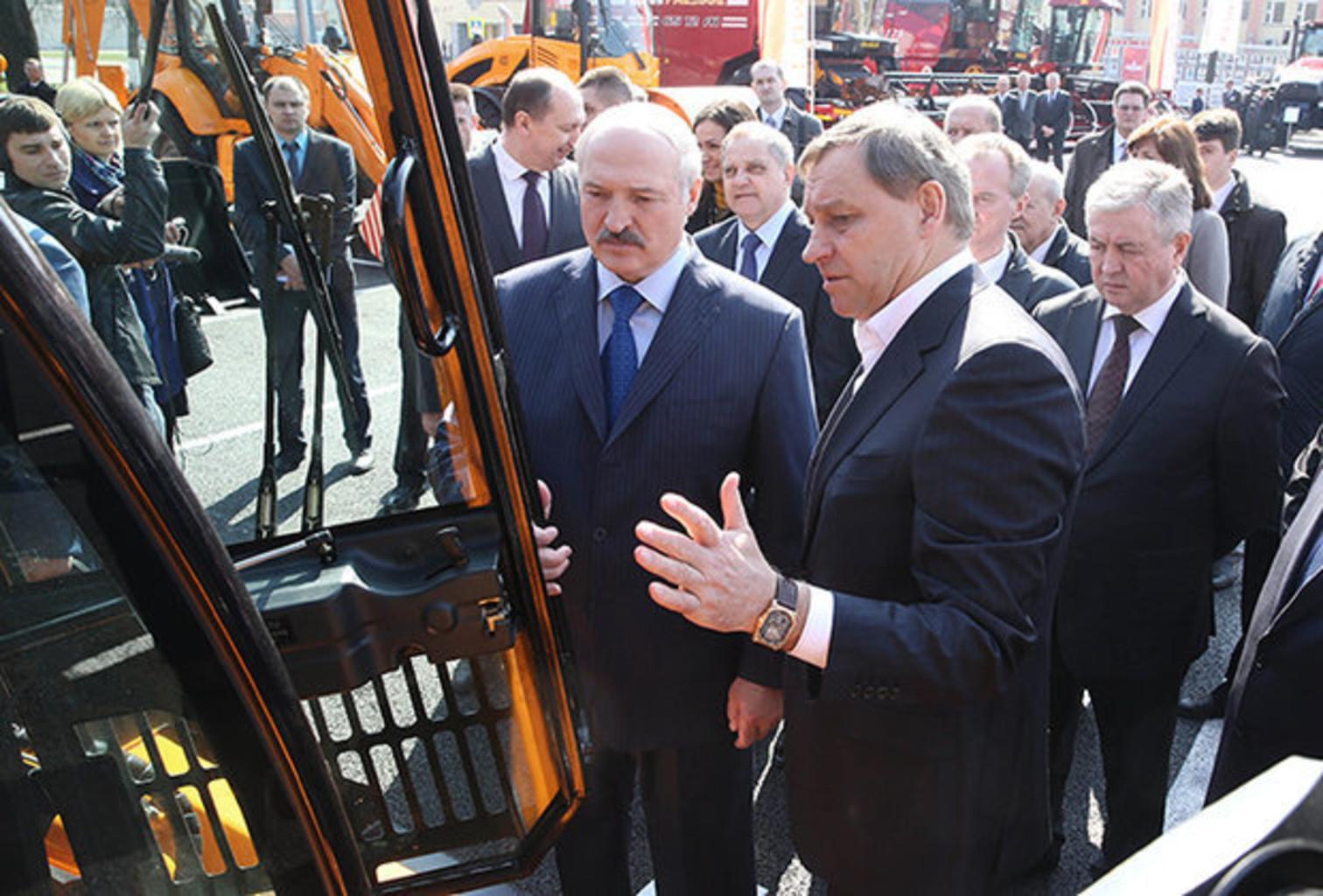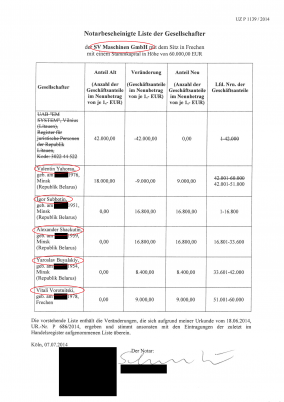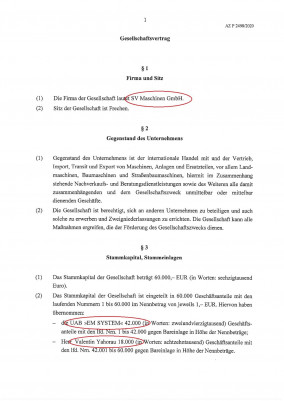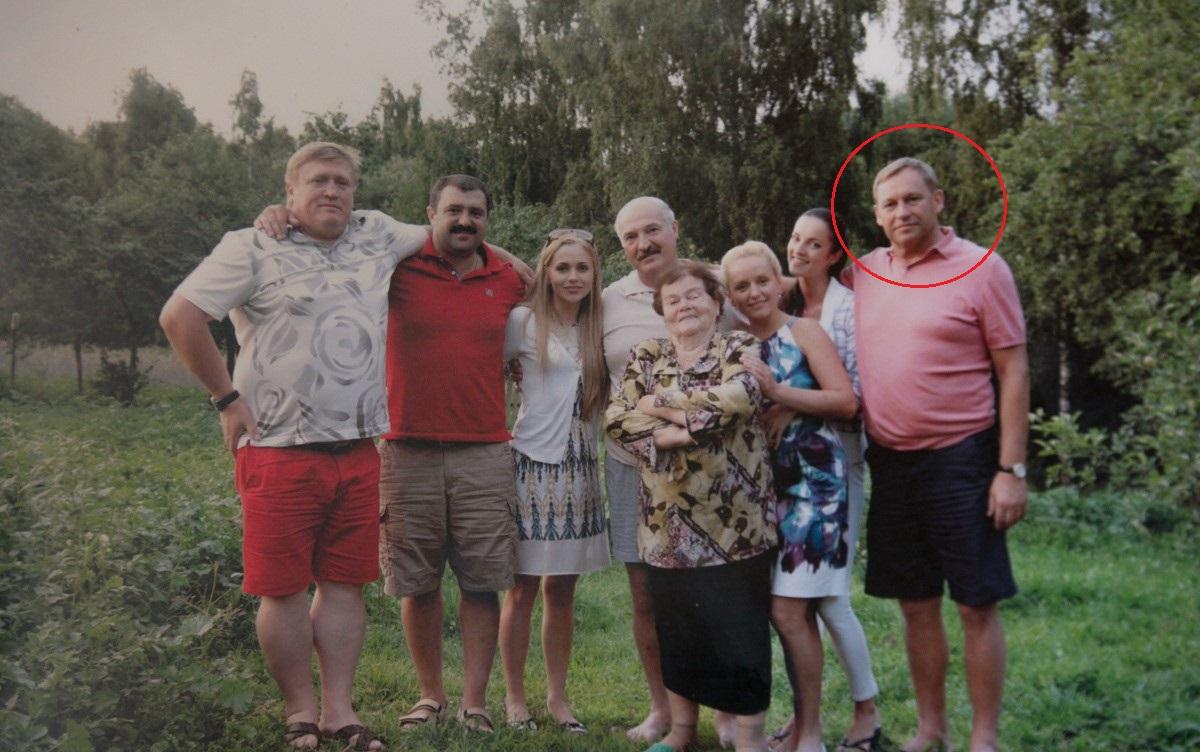This article was developed with the support of Journalismfund.eu.
Aleksandr Shakutin (Aliaksandr Shakutsin), slapped with EU sanctions as Lukashenka’s money-bag, keeps running a profitable business in Germany. He covertly manages a company through a Lithuanian firm, whose activities are banned in Lithuania and whose assets are frozen.
The Amkodor holding headed by Shakutsin has been operating at a loss – and at the expense of Belarusian taxpayers’ money – for several years. Amkodor’s operations are supported personally by Lukashenka, including by okaying the holding’s requests for loans.
Shakutin's wife and son are engaged in re-exporting flowers to Russia. The business brought tens of millions of dollars and resulted in exemption from certain taxes to the state budget.
As a rough estimate, it cost Belarusian taxpayers $100 million to run the business of the Shakutin family.
Foster mother Europe
In 2020, businessman Aleksandr Shakutin came under EU sanctions for supporting Aleksandr Lukashenko.
The activities of his companies in the EU were supposed to have been terminated. However, BIC found that Shakutsin has a company based in Germany which continues to operate and profit.
SV MASCHINEN supplies agricultural machinery to Eastern Europe. Its partners include Amazone, New Holland and Lemken. Undercover as a client, our colleague from Germany called the company with a request to deliver a line of imported combine harvesters to Belarus. The German office manager confirmed they offered such a service. The company’s financial statements show that its 2020 gross profit amounted to €3.5 million.
On 20 November 2023 and 11 December 2023, Vitali Vorotnitski, head of SV Maschinen GmbH, sent two emails to the BIC editorial team claiming that our investigation contains incorrect information. He specifically referred to the shareholder composition and the sanction avoidance scheme behind its change.
In 2023, the BIC launched several investigations into the activities of Lukashenko’s EU and US-sanctioned “money bag” Alexander Shackutin. Ten months after the first publication, our editorial team received an email from SV Maschinen GmbH, the German company mentioned in the investigations. It contained a letter, signed by Vitali Vorotnitski, the company’s managing director, that claimed that we have published incorrect information about the current shareholder structure of SV Maschinen GmbH. The company supplies Belarus and Russia with machinery from Western manufacturers who have announced their withdrawal from these markets.
According to the BIC investigation, the company is linked to Shackutin – and this is not disputed. However, the subjects of our investigation have provided clarification on the current distribution of shares in SV Maschinen GmbH.
The bottom line is this. The German public register contains two documents about the owners: the list of founding shareholders from 2014 and the articles of association from 2020, which show a different shareholder composition. Both documents list Alexander Shackutin as a beneficiary. However, the managing director of SV Maschinen GmbH claims that the current composition of the founding shareholders is in line with the data specified in the 2014 document and not the 2020 articles of association. The letter signed by Vitali Vorotnitski, director of SV Maschinen GmbH, explains that the articles of association, dated 2020, refer to the original shareholders and not the current ones. In other words, the composition of shareholders remains the same as in 2014 and has not changed in 2020 following the imposition of sanctions against the “moneybags” of Aleksandr Lukashenko.
In our investigation, based on the 2020 document, we claim that the composition of the shareholders has been renewed against the background of sanctions. Therefore, we have added a clarification to all texts where such a claim appears. However, this does not change the main point of the investigation: the company remains linked to Alexander Shackutin.
Based on the most recent documents available to us, the shareholders of SV Maschinen GmbH are Alexander Shackutin, Igor Subbotin, Yaroslav Buyalskiy, Valentin Yahorau, and Vitali Vorotnitski.
The letter from SV Maschinen emphasizes that Alexander Shackutin is not the majority owner of SV Maschinen GmbH. Additionally, since the imposition of sanctions against him, he has not received direct personal money transfers from this German company, despite remaining its co-founder. An audit-related document was provided as proof.
The BIC team acknowledges that although Alexander Shackutin’s share is not a majority, when combined with the shares owned by individuals connected to Shackutin through other business ties, the total will exceed 50% of the company’s ownership. These people include:
Igor Subbotin, who owns 28% of the company, is a long-time business partner of Alexander Shackutin, whom we detailed in one of our investigations. Reportedly, both of them used to work at the Minsk Tractor Plant. They started doing business together in 1997. Since then, they have been partners in at least 11 Belarusian and foreign firms.
Yaroslav Buyalskiy, who owns 14% of the company, and Shackutin, according to the latter, “once worked in the Central Committee of the Leninist Young Communist League of Belarus, even sharing an office for some time”. In 2005, Buyalskiy co-founded and CEO Prommedinvest, which is now known as Saleo – Holding Management Company. The company is owned by Shackutin, Subbotin, SV Maschinen GmbH, Lithuanian EM System, and others. Buyalskiy remained its CEO until 2014 and co-owner until 2018. Subsequently, he became a full-fledged partner of Shackutin and Subbotin in at least nine different firms, including Tekhpromimpeks, PMI Engineering, Amkodor-Tsentr, Amkodor-Service, Soyuzslavprom, Amkodor-SZ, UAB EM System, SIA Anulatrans and SV Maschinen GmbH.
Vitali Vorotnitski, who owns 15% of the company, worked as a department head at Spamash in 2007. Shackutin has been a co-founder of this firm since 2003.
Valentin Yahorau, who owns 15% of the company, according to his LinkedIn profile, has worked as Business Director of SV Maschinen GmbH since 2010. In 2007, he also worked at Spamash.
Vitali Vorotnitski’s letter claims that SV Maschinen GmbH was originally owned by Yahorau and Lithuanian EM System. In the summer of 2014, the Lithuanian company EM System, co-founded by Shackutin, Subbotin, and Buyalskiy at that time, stopped being a shareholder and was replaced by its owners: Shackutin, Subbotin, and Buyalskiy. A new name has also been added to the list – Vorotnitski, in whose name the e-mail was sent to our editorial team. Two of our inquiries sent earlier to SV Maschinen GmbH were not answered by the company.
The letter also requests that the allegation in the investigation concerning SV Maschinen GmbH’s cooperation with Amkodor be refuted. However, there are no such claims in our publications.
Experts interviewed by BIC believe that SV MASCHINEN managed to circumvent EU sanctions legislation due to a confusing ownership structure. It changed in September 2020, shortly before restrictions were imposed on Shakutsin. Initially, he owned the company together with his long-time partners: Yaroslav Buyalskiy, Igor Subbotin,Vitali Vorotnitski and Valentin Yahorau.
The restructuring only left Yahorau among the owners with a share of 30%. The remaining 70% belongs to the Lithuanian company EM SYSTEM.
This company has been hit by Lithuanian national sanctions and its €8 million worth of assets have been frozen, along with another €6 million of undistributed profits.
The imposition of sanctions was caused by Aleksandr Shakutin’s co-ownership of the company that he shares with Igor Subbotin.
Another Lithuanian company, Amkodor Baltic, was sanctioned because of its connection with EM SYSTEM. Its accounts were blocked precisely because of the firm’s ties with Shakutsin, as we learned from a leaked email sent by Amkodor’s lawyer.
In Germany, however, EM SYSTEM’s subsidiary has not been traced back to Shakutsin and thus has avoided restrictions. Its representative office in Minsk is fully functional: in 2021, its net profit was about $1 million.
Thus, Aleksandr Shakutin has been making business in the EU for two years despite all the Brussels sanctions. We have asked the German Finance Ministry for an official comment and are awaiting a response.
The flower squad
In 2017, Aleksandr Shakutin married for the second time.

The 58-year-old businessman’s Miss Right became 22-year-old Maryia Sakirkina, an economic university graduate and participant in the Spring Queen grace and artistic excellence contest. A week after their wedding they went to the UAE in the company of Aleksandr Lukashenko.

As early as 2020, Maryia started a business venture. Together with her father and stepson, Aleksandr Shakutin Jr., she became a co-owner of the Beltamozhvilia company. Their total share is 71.25%. The rest used to belong to Spamash LLC owned by the Shakutshin family and the Hungarian company Lucky Trade Group Hungary, which was liquidated last year.


Beltamozhvilia was registered in Vilejka, and in 2020 – when the Shakutsins became shareholders of the company – economic activity in the area increased sharply. In January-September 2020, exports rose 7 times ($94 million) compared to the same period in 2019, while imports increased 47 times ($204 million).
In the same period in 2021, the district continued to build up its foreign trade. By September 2021, total goods turnover amounted to $362 million, with $125 million in exports and $236 million in imports.
But at the end of 2021, the town stopped demonstrating the abnormal economic activity, and this coincided with the relocation of Beltamozhvilia.
The company had been operating in Vilejka since its founding in 2007, but its activity was rather modest and even marginal in 2019. With the Shakutsins in charge, the firm has shown dramatic growth: revenues rose 1,878 times, reaching almost 300 million roubles, with a net profit of 11.3 million roubles.
In 2021, Beltamozhvilia's revenues amounted to 362 million roubles.
According to Russian arbitration court records, the firm's business profile is the re-export of flowers to Russia. This business blossomed in 2011 when Aleksandr Lukashenko issued a decree that offered import privileges for re-export. The decree completely exempted importers from paying VAT, provided that the goods were further exported from Belarus. This allowed Belarusian re-exporters to avoid paying taxes to the state budget and earn excessive profits.
The mass re-export of flowers from Belarus to Russia started with that ruling. However, VAT was still obligatory in Russia, so the goods were significantly undercharged. Aleksandr Shakutin and his son participated in this scheme with another firm they owned, Logex.
A Resolution of the Belarusian Council of Ministers classified the financial statements of this company.
However, BIC managed to estimate the excess profits of the Shakutsins’ new flower business.
The revenues of Beltamozhvilia in the two years of the Shakutsins’ management amounted to $264 million. Shakutsin’s wife, son and father-in-law were supposed to pay 20% of this amount to the state budget as VAT on imports, but Lukashenka personally exempted them from payments.
Backscratching
Shakutsin was repeatedly spotted among Aleksandr Lukashenko’s cronies. He even went to the president’s mother-in-law for potato picking.
In 2020, Shakutsin was among the guests at Lukashenka's "secret inauguration".
Lukashenka also helped Shakutsin financially when the latter decided in 2016 to build the 140,000-square-metre Shantеr Hill multi-purpose complex next to Minsk Arena and Drazdy estate.
The main investor in the project was the Chinese company Citic Group which cashed up $120 million. Shakutsin noted that the loan was granted "on favourable terms and had a good length". Aleksandr Lukashenko's hand was in play here again.
Shakutsin and Lukashenka have also repeatedly used Air Force One. It is known for a fact that they flew to China, Venezuela, Qatar and the UAE together.
In October 2017, for example, Shakutsin and Lukashenka travelled to Abu Dhabi. Officially, the trip was called a "working visit", but it was rather a holiday. The visit was announced on 27 October, but thanks to the Cyberpartisans hacker group, we learned that Air Force One had departed from Minsk two days earlier. Shakutsin and Lukashenka were accompanied by Nikolai Lukashenko’s first teacher, his piano teacher, as well as a singer, a doctor and a protocol service clerk.
During the 12 days they spent in the UAE, Lukashenka had two official meetings: with the Crown Prince of Abu Dhabi and then-Ukrainian President Petro Poroshenko.
The Shakutsin family spends most of their time in Belarus. In the prestigious Vesninka estate in Minsk, they have a cottage, which our experts estimated at $1 million.
According to the media, the Shakutsins' neighbours include the former head of the National Bank Nadzeya Ermakova, businessman Sergei Teterin, and artist Anatol Yarmolenka.
Moreover, Aleksandr Shakutin bought a flat on Pieramožcaŭ Avenue in Liabiažy estate in 2016. Its cost is estimated at $250,000.
Maryia Shakutina owns a flat in her home city Žlobin. She received it as a gift in 2017, two weeks before her wedding.
It is all about technicalities
Aleksandr Shakutin is known as the only big fish in Belarus' industrial sector. For over 20 years he has co-owned the Amkodor holding which produces lift trucks, asphalt pavers and reclamation equipment. Almost a third of those products are exported, mainly to Russia. Before Shakutsin became the manager, the company had been in business for some 70 years. For the past decade, it had been in private hands, with a small state shareholding. Together with his Nepalese partners, Shakutsin gradually bought out individual shareholders' interests and thus gained a controlling stake in Amkodor.
The privatisation significantly strengthened Shakutsin’s position, and in 2013 he was named the second most influential businessman in Belarus. For Amkodor itself, however, this had the opposite effect in the long run: the company started operating at a loss. The holding compensates for its losses with loans from the state budget. By the end of 2021, its long-term debt reached almost $120 million. Uncovered losses amounted to $42 million.
Around the same time, Aleksandr Lukashenko issued a decree “on the stabilisation of the financial situation of enterprises”, granting Shakutsin a loan of some $50 million at half the refinancing rate (about 4% per annum). Moreover, this loan does not have to be paid back in cash. The decree stipulates the possibility of mutual settlements and repayment in shares.
The regular state subsidies refute the common notion that Amkodor acts as a “good corporate citizen” since it incorporates unprofitable state enterprises into the holding. In fact, it is partly financed at the expense of taxpayers.
We thank CyberPartisans, a pro-democracy hacker group, for their help in making this investigation.







